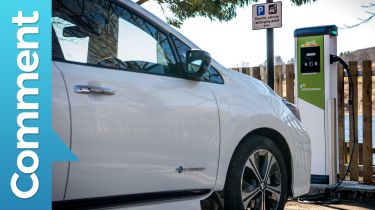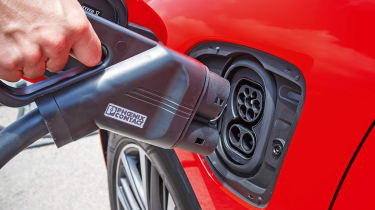Take a leaf out of Germany’s book: fine drivers for blocking charging points
Germany has started fining non-electric and hybrid drivers for stopping in plug-in parking bays, so should the UK follow suit?

Updated traffic laws in Germany came into force this week, including the new measure of fines for drivers of non-electric or hybrid cars who park in charging-point parking areas.
The €55 (around £48) fine was announced by the country’s Federal Ministry of Transport and Digital Infrastructure, along with increased penalties for speeding and stopping in fire lanes, plus a ban on using apps that detail the location of fixed and mobile speed cameras.
With electric and plug-in hybrid car usage on the rise throughout the UK and Europe (pure-electric car sales are up 197% in Britain year-on-year, for example) issuing tickets to petrol and diesel drivers blocking electric parking bays is beginning to look like a common-sense move.
Most electric-car drivers know the frustration of arriving at a public charging station, only to find the few available points taken by fellow plug-in drivers. And that grievance is multiplied tenfold when one of those charging bays is blocked by a diesel Volkswagen or a petrol Porsche – or any other vehicle without a plug for that matter.

But can we really expect people to take notice without better visibility or stricter penalties? Only this week, the AA issued research backing clearer signage of electric charging points, claiming that while numbers are increasing, the current crop are “hidden in plain sight”.
A DrivingElectric investigation into some of the UK’s biggest parking providers recently revealed that in many cases it's down to individual parking attendants’ discretion, with no formal rules or regulations as to whether a non-plug-in car should be fined or towed when parked in an electric-only bay.
One thing I’m certain about is that these spots shouldn’t simply be seen as priority parking. There should be strict time limits in place – like you’d have at any motorway service station or on-street loading zone – and if you’re parked you must be plugged in; we can’t expect Mr or Mrs Parking Attendant to know the difference between a Nissan Leaf and Vauxhall Astra.
And what about plug-in hybrid cars? There’s been much discussion online among electric-car evangelists about how hybrid drivers should be banned from using public rapid chargers on high-traffic routes. After all, they’ve got a petrol engine to fall back on – and what use is 20 miles of electric range on a motorway or A-road, anyway?
What do you think? Should non-EV or plug-in hybrid drivers be fined for parking in specified charging bays? Let us know on Twitter @DrivingEVs, or send an e-mail to hello@drivingelectric.com.
